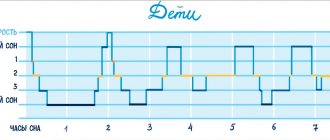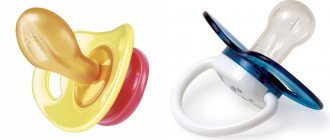In the article we will talk about what motion sickness is, what benefits or harms it has, how to understand that a child wants to sleep, and we will give some tips on preparing a child for sleep.
Proper sleep is the key to a child’s physical and mental development. But children do not always fall asleep quickly. This happens due to improper routine, insufficient physical activity or overstimulation during the day. To put a child to sleep faster, parents use an old technique - motion sickness.
Why does my child sleep poorly?
Typically, parents rock their child to sleep when he has trouble falling asleep or often wakes up in the middle of the night. Causes of poor sleep in children:
- improper daily routine and insufficient physical activity;
- violation of the temperature regime in the room, low or high humidity;
- unventilated or noisy room;
- a lot of light falls on the child’s bed through the window;
- the baby sleeps too much during the day;
- insomnia, which is characterized by difficulty falling asleep and insufficient sleep duration. This disorder affects 1% to 6% of children. Insomnia in young children occurs due to the fact that parents cannot put the child to bed and wake up at the same time;
- breathing problems during sleep, such as snoring or sudden short-term cessation of breathing. These disorders occur in 27% of children;
- restless legs syndrome, in which a child jerks his legs involuntarily during sleep, which is why he does not get enough sleep at night and feels drowsy during the day;
- autism spectrum disorders, in which children produce less of the sleep hormone melatonin than healthy children;
- pathological conditions or diseases, for example, intoxication due to infections.
Babies also have trouble sleeping due to nightmares. Children's night terrors most often arise as a result of family conflicts, excessive impressionability and increased anxiety, for example, when during the day the baby asked to be held several times, but the mother did not pay attention to this. If you find that your child is systematically sleeping poorly, consult a neurologist or child psychiatrist.
Possible causes of restless sleep
If we talk about newborns, then periodic night crying (but not constant) signals hunger. Also, the baby may experience discomfort and fear if he sleeps in a separate crib and does not feel his mother. Babies under 4 months of age often have tummy problems. And from about six months, children begin to sleep poorly due to painful teething. Is it worth talking about proper sleep if the child is cold or hot, uncomfortable in a diaper, or has eaten too much? Often, parents notice that before getting sick, the child stopped sleeping at night. This is the first symptom of a cold, when the others are still invisible. Sometimes children “confuse” the time of day, their normal rhythm is disrupted, so they sleep more during the day, and at night they encourage their parents to play. It is important to note: if sleep disturbances are permanent, the baby cries all the time and is difficult to calm him down, then you need to seek help from a specialist and undergo an examination. Sometimes this problem is a sign of neurological diseases, rickets, etc.
The harm and benefits of motion sickness
One of the main benefits of motion sickness is strengthening the psychological bond between the child and the mother. In your arms the baby feels protected. The need for basic security is satisfied. This helps the child grow up with confidence and interest in the world around him. It is easier for him to meet and communicate with people, perceive new information and learn.
The second “plus” of motion sickness is that the child falls asleep faster. Any rhythmic sound or movement puts a person into a trance - attention is directed to the inner world, images, fantasies and sensations. This speeds up falling asleep. In adults, an analogy can be made with counting sheep, concentrating on one object, or breathing.
However, this is only useful if parents rock the baby correctly: sitting and in silence. Fast and sharp movements, on the contrary, stimulate the child. Within a few minutes of slow and rhythmic rocking, you can feel that the baby's muscles are relaxing - the baby is falling asleep, but not yet completely. At this point you need to put him in his crib. Do this before your baby falls asleep completely in your arms, otherwise he may wake up. While rocking, try to quietly hum a pleasant melody so that the baby feels your presence.
Improper rocking can harm the baby. There is Shaken baby syndrome or baby shake syndrome. This is a pathology in which the baby's brain is damaged due to strong shaking. Most often, such situations arise when the emotional state of the parents is at the limit, and they involuntarily shake the child so that he falls asleep faster.
How to improve your baby's sleep
If your child does not have complex illnesses and sleep problems are temporary, try the following tips:
- Almost from the maternity hospital with a baby, you need to prioritize sleep issues. At first it will not be easy, but over time he will learn to intuitively understand that the time has come when everyone is resting and he himself needs to sleep too. To do this, it is important to be consistent with all family members, choose a period of time when everyone goes to bed (or behaves very quietly) and gets up. For example, from 21:00 to 5:00. The time frame cannot be shifted for the child. Newborns, of course, can still wake up at night to feed. But from about 6 months, with strict adherence to the regime, babies are able to sleep up to 8 hours at night.
- Rocking your baby in your arms to fall asleep is not at all necessary. This process does not affect the health and soundness of sleep. However, the opposite problem is often observed. After being rocked in his arms, the baby immediately begins to cry as soon as he gets into his crib, sleeps restlessly in it, and asks to be held by his mother. If you want your baby to sleep in his own cradle, accustom him to it from birth. Go to bed at the same time, sing songs or tell stories - the quiet, calm voice of your parents has a calming effect. In addition, many crib models are equipped with a pendulum.
- Daytime activity is also important for night sleep, so it’s worth thinking about your routine in advance: what time you will get up and eat, how much time is allocated for walks and games, when you will bathe and get ready for bed. Kids quickly fall into a routine, and it gives them a feeling of stability and security. In addition, a good night's sleep is possible if the child is well tired (but not overexcited, otherwise the effect will be the opposite). Long walks in the fresh air, age-appropriate educational games, gymnastics, massage, hardening - all this helps you fall asleep better. The main thing is that active activities do not begin closer to the night. In the evening, it is better to read a book or play calm children's songs.
- It is important to find a balance between sleep and meals in children of the first year of life, as these are the basic needs at this age. The main thing to remember here is that breastfeeding on demand should still have a system that will coincide with the daily routine. If your baby asks for breastfeeding every half hour, you should consult a specialist. If a baby is bottle-fed, a night break in feeding is required, from approximately 24:00 to 6:00 in the morning. With a correctly calculated daily and one-time feeding volume, the child can easily withstand this time.
- Bathing and a light massage can be used as a ritual to prepare for bed. Kids quickly remember the sequence of actions.
- The quality of sleep is also determined by the microclimate in the room. The child's room should not be too cold or hot. Recommended temperature – 20 °C, humidity – 50–70%. It is important to regularly clean and ventilate the room, but make sure that the child is not in a draft.
- Parents should take care not only of the cleanliness and comfort of the room, but also of a properly organized sleeping area. The quality of the mattress plays an important role. It should be made of environmentally friendly materials and have medium rigidity for proper back support. Bed linen should also be made from natural fabrics. And while the child is very small, he doesn’t need bright cartoon characters on the sides and duvet cover. It is better to choose something calm and minimalistic. By the way, a child under 2 years old also does not need a pillow, unless the doctor recommends otherwise.
- And one more delicate point - dryness. It’s hard to imagine the everyday life of modern parents without diapers. But the choice of these hygiene products must be taken very seriously. In low-quality diapers, liquid is poorly absorbed and irritation and diaper rash may occur. Naturally, discomfort will be a constant cause of sleepless nights. When choosing the appropriate option, pay attention to the absorbent layer. It would also be a good idea to check the comfort of the fasteners or elastic bands when it comes to panty diapers.
(1 ratings; article rating 5.0)
Share Share Share
How to understand that a child wants to sleep
In order for your child to be active, healthy and well-rested, you need to put him to bed on time and follow the rules of children's naps. To do this, you need to be able to recognize the signs that indicate that the child wants to sleep:
- rubs his eyes;
- yawns;
- looks for a pacifier or breast to suck, sucks his own finger;
- rubs ears, nose, head or pulls hair;
- does not want to play, tries to climb onto the crib or into your arms.
These are signs of fatigue at which you need to put your baby to bed. If this is not done, fatigue turns into overwork: the child begins to be capricious, cry, throw toys, and refuse the breast or pacifier. In this case, it will take much longer to fall asleep.
What is considered a bad dream?
A child is considered to be sleeping poorly if the following signs are present:
- Does not fall asleep well (is capricious when lying down, spins, requires rocking and the presence of an adult, sucks a finger or a bottle).
- Frequently wakes up during the night.
- Confused day with night.
- After waking up at night, he has difficulty falling asleep.
In addition to poor sleep, we must talk about poor sleep. This is a whole problem for many children and their parents. At 6 months, the child can already fall asleep on his own. But most often, parents have to rock the baby to sleep and be present when they fall asleep.
Causes
The reasons why a newborn baby does not sleep can be various factors. Often, sleep disturbance is not at all an indicator of any developmental abnormality in the little person. Of course he won't tell you what's bothering him.
To do this, parents need to analyze the situation, check the microclimate of the room, check the skin for irritation, massage the tummy, etc.
Malnutrition
One of the common causes of poor sleep in infants may be malnutrition. This is affected by:
- insufficient amount of mother's breast milk;
- the baby quickly falls asleep without receiving the required portion of milk;
- does not eat enough formula when artificial or mixed feeding.
Based on the weight and development of the little person, the children's doctor will be able to determine the need to increase or add complementary foods and give recommendations on replacing the formula.
If your little one falls asleep while feeding, you need to touch his cheek. He will wake up and continue to eat. This will improve the quality of rest of a well-fed baby.
Colic
The gastrointestinal tract of the toddler is just beginning to adapt to the independent digestion of food. Due to excessive formation of gases in the intestines, the little one is bothered by colic. Understanding what worries him is quite simple. The baby suddenly begins to scream loudly, may spin around, raise his arms and legs, and his tummy becomes tense.
Not all infants are susceptible to colic, but it is one of the most common problems during this period. Intestinal and stomach colic in infants gradually decreases and disappears by 4 months. Parents will need patience, endurance, and calmness.
Causes of colic.
- Formation of intestinal microflora.
- Improper nutrition of a nursing mother.
- Air entering the esophagus during feeding.
- Allergic reaction to mixtures during IV.
- Infant overeating.
You can combat this problem by applying a warm diaper to the baby’s tummy, raising or bending the legs to stimulate the passage of gases. A last resort may be the use of a gas outlet tube.
Diseases
The baby sleeps little, constantly cries or is excessively lethargic, refuses to eat, has a high body temperature, it is necessary to call a pediatrician or an ambulance. Most likely the cause was a viral or bacterial infection.
Parasites
The age period from 1 to 5 years is susceptible to the appearance of worms in children. This is due to going to kindergarten, non-compliance with hygiene rules, and the habit of putting everything in your mouth: dirty hands, other people's toys, sand, earth.
There are known cases of children becoming infected from pets. Therefore, it is better to limit the contact of your beloved pet with your baby.
Signs of parasites may include:
- restlessness during rest;
- allergic skin rashes;
- refusal to eat;
- stomach ache;
- excessive salivation;
- constipation or loose stools.
It is quite difficult to determine the symptoms of helminthiasis in infants, so if you have any suspicions, you need to do a stool test.
Skin irritations
Untimely changing of diapers, an allergic reaction to detergents, increased body humidity, constant contact with feces and urine can lead to diaper rash, rashes, and skin irritation.
In the initial stages of dermatitis with slight redness of the affected areas, infants do not experience anxiety. The formation of weeping wounds, which are accompanied by pain and severe itching, can be the reason why the baby does not sleep.
Other reasons
It is necessary to analyze what other factors may influence the fact that the baby does not sleep well during the day. Possibly interfering:
- loud extraneous sounds (TV, music, repair work);
- bright light;
- dry, hot indoor climate;
- unpleasant odors;
- dirty diapers, nappies;
- overexcitement.
A newborn's rest consists of only 30% of sound sleep, like that of an adult. Most of it is occupied by superficial naps, in which the baby is sensitive to stimuli.
If a toddler falls asleep in his mother's arms, you should not rush to transfer him to the playpen. You need to make sure that the phase of sound sleep has arrived.
Features of children's sleep
Babies under 3 months sleep on average up to 20 hours a day. Subsequently, the waking phase gradually increases. But do not forget that all children are individual, so they should not be forced into strict limits. According to pediatricians, the norm is for an infant to sleep between 16 and 20 hours.
The newborn is not yet accustomed to the regime, so he sleeps both day and night. The quality and duration of rest entirely depend on such an important indicator as the child’s well-being. In the first months of life, problems associated with increased intracranial pressure, colic, and so on often appear. These disturbances lead to deterioration of sleep and are accompanied by screaming and loud crying.
The baby may wake up from hunger at any time of the day or skip meals due to dozing. Doctors say that you should only worry when the baby does not wake up to feed after 4 hours of sleep. In this case, you should consult a doctor.
Often hunger is compensated by sleep. If the child does not wake up for more than 4 hours, you should wake him up yourself in order to feed him. However, it is better when the baby himself asks to eat.
Sleeping mode
For full development, babies need to eat regularly. The intervals between feedings range from 2 to 4 hours. It takes the little one about 30-40 minutes to stay awake, then he falls asleep again.
Daytime rest may differ from nighttime. During the day, the baby can spend less time on rest, then acquaintance with the outside world will last longer. There is no active phase at night; at the time of feeding, the baby dozes.
If a child sleeps little at night and during the day, you should monitor his behavior, find out what may be causing concern, and consult a pediatrician.










